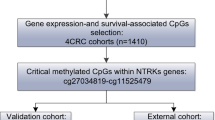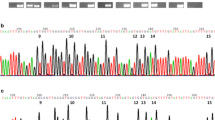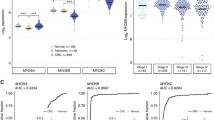Abstract
Myopodin is an actin-binding protein believed to play a tumor suppressor role in several solid neoplasias. We evaluated the potential differential myopodin methylation and expression and their clinical relevance in colon cancer. The epigenetic silencing of myopodin by hypermethylation was tested in colon cancer cells (n = 5) before and after azacitidine treatment. Myopodin methylation status was evaluated by methylation-specific PCR in colon cancer cells and colorectal tissues (n = 210) grouped in a training set (n = 62) and two independent validation series (n = 100 and n = 48) collected at independent clinical settings. Myopodin expression patterns were analyzed by immunohistochemistry on tissue arrays. Myopodin hypermethylation correlated with gene and protein expression loss, being increased in vitro by azacitidine. Myopodin was frequently methylated in colon cancer cells (four out of five). Methylation rates were 90.3%, 70.0%, and 47.8% in the training and validation sets, respectively. Myopodin methylation rendered a diagnostic accuracy of 83.9% (p < 0.0005). Cytoplasmic myopodin expression was significantly higher in non-neoplastic biopsies compared to colon tumors (p < 0.0005). Loss of myopodin expression correlated with increasing tumor stage (p = 0.011), methylation (p = 0.005), and poor overall survival (p = 0.003). In the first validation set (n = 100), myopodin methylation predicted disease-free (p = 0.046) and overall survival (p = 0.031). In the second validation cohort, myopodin methylation and protein expression patterns predicted disease-specific (p = 0.012 and p = 0.001, respectively) and overall survival (p = 0.009 and p = 0.043, respectively). Thus, myopodin was revealed to be epigenetically modified in colon cancer. The diagnostic and prognostic clinical utility of myopodin methylation and expression patterns suggest considering their assessment for the clinical management of colon cancer patients.




Similar content being viewed by others
References
Jemal A, Bray F, Center MM, Ferlay J, Ward E, Forman D. Global cancer statistics. CA Cancer J Clin. 2011;61:69–90.
Cunningham D, Atkin W, Lenz HJ, Lynch HT, Minsky B, Nordlinger B, Starling N. Colorectal cancer. Lancet. 2010;375:1030–47.
Grady WM, Carethers JM. Genomic and epigenetic instability in colorectal cancer pathogenesis. Gastroenterology. 2008;135:1079–99.
Carmona FJ, Esteller M. Epigenetics of human colon cancer. Mutat Res. 2010;693:53–60.
Rashid A, Issa JP. CpG island methylation in gastroenterologic neoplasia: a maturing field. Gastroenterology. 2004;127:1578–88.
Sánchez-Carbayo M, Cordon-Cardo C. Applications of array technology: identification of molecular targets in bladder cancer. Br J Cancer. 2003;89:2172–7.
Jordà M, Peinado MA. Methods for DNA methylation analysis and applications in colon cancer. Mutat Res. 2010;693:84–93.
Sánchez-Carbayo M. Use of high-throughput DNA microarrays to identify biomarkers for bladder cancer. Clin Chem. 2003;49:23–31.
Herman JG, Baylin SB. Gene silencing in cancer in association with promoter hypermethylation. N Engl J Med. 2003;349:2042–54.
Esteller M. CpG island hypermethylation and tumor suppressor genes: a booming present, a brighter future. Oncogene. 2002;21:5427–40.
Kim MS, Lee J, Sidransky D. DNA methylation markers in colorectal cancer. Cancer Metastasis Rev. 2010;29:181–206.
Cheng YW, Pincas H, Bacolod MD, Schemmann G, Giardina SF, Huang J, Barral S, Idrees K, Khan SA, Zeng Z, Rosenberg S, Notterman DA, Ott J, Paty P, Barany F. CpG island methylator phenotype associates with low-degree chromosomal abnormalities in colorectal cancer. Clin Cancer Res. 2008;14:6005–13.
Weins A, Schwarz K, Faul C, Barisoni L, Linke WA, Mundel P. Differentiation- and stress-dependent nuclear cytoplasmic redistribution of myopodin, a novel actin-bundling protein. J Cell Biol. 2001;155:393–404.
Van Impe K, De Corte V, Eichinger L, Bruyneel E, Mareel M, Vandekerckhove J, Gettemans J. The Nucleo-cytoplasmic actin-binding protein CapG lacks a nuclear export sequence present in structurally related proteins. J Biol Chem. 2003;278:17945–52.
Faul C, Hüttelmaier S, Oh J, Hachet V, Singer RH, Mundel P. Promotion of import alpha-mediated nuclear import by the phosphorylation-dependent binding of cargo protein to 14-3-3. J Cell Biol. 2005;169:415–24.
De Ganck A, Hubert T, Van Impe K, Geelen D, Vandekerckhove J, De Corte V, Gettemans J. A monopartite nuclear localization sequence regulates nuclear targeting of the actin binding protein myopodin. FEBS Lett. 2005;579:6673–80.
Faul C, Dhume A, Schecter AD, Mundel P. Protein kinase A, Ca2+/calmodulin-dependent kinase II, and calcineurin regulate the intracellular trafficking of myopodin between the Z-disc and the nucleus of cardiac myocytes. Mol Cell Biol. 2007;27:8215–27.
Liang J, Ke G, You W, Peng Z, Lan J, Kalesse M, Tartakoff AM, Kaplan F, Tao T. Interaction between importin 13 and myopodin suggests a nuclear import pathway for myopodin. Mol Cell Biochem. 2008;307:93–100.
Lin F, Yu YP, Woods J, Cieply K, Gooding B, Finkelstein P, Dhir R, Krill D, Becich MJ, Michalopoulos G, Finkelstein S, Luo JH. Myopodin, a synaptopodin homologue, is frequently deleted in invasive prostate cancers. Am J Pathol. 2001;159:1603–12.
Yu YP, Tseng GC, Luo JH. Inactivation of myopodin expression associated with prostate cancer relapse. Urology. 2006;68:578–82.
Sanchez-Carbayo M, Schwarz K, Charytonowicz E, Cordon-Cardo C, Mundel P. Tumor suppressor role for myopodin in bladder cancer: loss of nuclear expression of myopodin is cell-cycle dependent and predicts clinical outcome. Oncogene. 2003;22:5298–305.
Jing L, Liu L, Yu YP, Dhir R, Acquafondada M, Landsittel D, Cieply K, Wells A, Luo JH. Expression of myopodin induces suppression of tumor growth and metastasis. Am J Pathol. 2004;164:1799–806.
Yu YP, Luo JH. Myopodin-mediated suppression of prostate cancer cell migration involves interaction with zyxin. Cancer Res. 2006;66:7414–9.
Yu YP, Luo JH. Phosphorylation and interaction of myopodin by integrin-link kinase lead to suppression of cell growth and motility in prostate cancer cells. Oncogene. 2011;30:4855–63.
Cebrian V, Alvarez M, Aleman A, Palou J, Bellmunt J, Gonzalez-Peramato P, Cordón-Cardo C, García J, Piulats JM, Sánchez-Carbayo M. Discovery of myopodin methylation in bladder cancer. J Pathol. 2008;216:111–9.
Alvarez-Múgica M, Cebrian V, Fernández-Gómez JM, Fresno F, Escaf S, Sánchez-Carbayo M. Myopodin methylation is associated with clinical outcome in patients with T1G3 bladder cancer. J Urol. 2010;184:1507–13.
Ogino S, Chan AT, Fuchs CS, Giovannucci E. Molecular pathological epidemiology of colorectal neoplasia: an emerging transdisciplinary and interdisciplinary field. Gut. 2011;60:397–411.
Puppa G, Sonzogni A, Colombari R, Pelosi G. TNM staging system of colorectal carcinoma: a critical appraisal of challenging issues. Arch Patol Lab Med. 2010;134:837–52.
Dawson-Saunders B, Trapp RG. Basic & clinical biostatistics. 2nd ed. Norwalk: Appleton & Lange; 1994.
Duffy MJ, van Dalen A, Haglund C, Hansson L, Holinski-Feder E, Klapdor R, Lamerz R, Peltomaki P, Sturgeon C, Topolcan O. Tumour markers in colorectal cancer: European Group on Tumour Markers (EGTM) guidelines for clinical use. Eur J Cancer. 2007;43:1348–60.
De Ganck A, De Corte V, Staes A, Gevaert K, Vandekerckhove J, Gettemans J. Multiple isoforms of the tumor suppressor myopodin are simultaneously transcribed in cancer cells. Biochem Biophys Res Commun. 2008;370:269–73.
Acknowledgments
We thank all members of the laboratory of M. Sánchez-Carbayo for the technical support and constructive suggestions in the preparation of this manuscript. We also would like to thank the Tumor Bank belonging to the Molecular Pathology Program at the Spanish National Cancer Center and all the members of our clinical collaborators at the different institutions involved in this study for the support in facilitating the tumor specimens as well as the clinical follow-up of the colon cancer cases analyzed in this study.
Grant support
Spanish Ministry of Science and Innovation grant SAF2009-13035 and Mutua Madrileña 2010 (to M. Sánchez-Carbayo).
Conflicts of interest
None.
Author information
Authors and Affiliations
Corresponding author
Rights and permissions
About this article
Cite this article
Esteban, S., Moya, P., Fernandez-Suarez, A. et al. Diagnostic and prognostic utility of methylation and protein expression patterns of myopodin in colon cancer. Tumor Biol. 33, 337–346 (2012). https://doi.org/10.1007/s13277-012-0320-8
Received:
Accepted:
Published:
Issue Date:
DOI: https://doi.org/10.1007/s13277-012-0320-8




